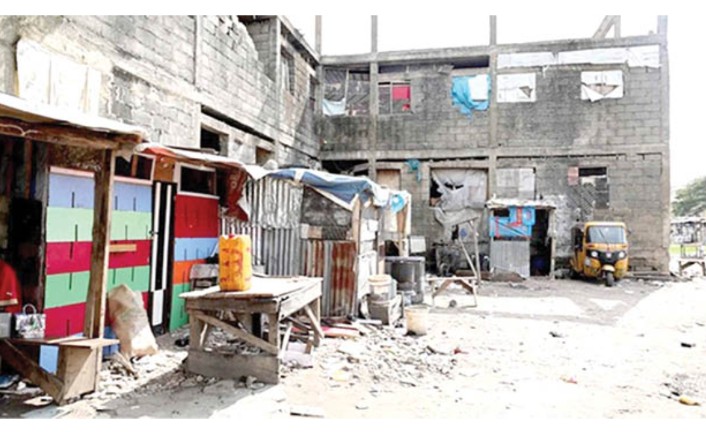
In search of greener pasture, many Nigerians sleep in cars, abandoned buildings in Abuja Poverty, insecurity and the quest for a better life have seen many Nigerians troop into Abuja; the country’s seat of power. But the harsh realities…

Poverty, insecurity and the quest for a better life have seen many Nigerians troop into Abuja; the country’s seat of power. But the harsh realities have been unexpected. They are now classified as homeless; finding refuge in abandoned buildings and cars.
For many Nigerians and visitors to the Federal Capital Territory, Abuja’s magnificent edifices, expansive and sleek streets, with lined up trees captivate the senses. It has earned a place in magazines and blogs as a place of aesthetic beauty and is referred to as Africa’s fastest growing city.
Within its city walls are the top guns that are in charge of the political affairs of the nation and its slogan, ‘center of unity’ solidifies its reputation as a home for all.
But a flip side of the city exists. A contrast of Abuja’s power and beauty is reflected in the many residents struggling with shelter. Driven from their homes by the brutal realities of poverty, insecurity and the search for better life, many troop into Abuja, not as criminals, but as refuge seekers eager to drink from its fountain of wealth.
From 2020 to date, data by Macrotrend, an international data gathering site revealed that more people from the hinterlands have relocated to Abuja, as the city witnessed an increased population of over 22.81 per cent. The data shows Abuja’s population rose from 3,278,000 in 2020 to 4,026,000 in 2024. Macrotrend projects that by 2035, the population of Abuja may rise to over six million.
However, the harsh reality of the city bites deep, as crushing rents force many into homelessness; sleeping in abandoned and uncompleted buildings and in vehicles.
In the ‘comfort’ of an abandoned hospital
The air hangs heavy, a putrid blend of waste and stale urine welcomes one into an abandoned, uncompleted hospital, now home to over 100 people, including children in Utako area of the city. Within this decaying structure, its inhabitants carve out spaces with not enough to make room for a kitchen. There is no convenience, and so its inhabitants rely on the veil of the night to trek a distance in search of open spaces to empty their bowels.
Inside the confines of this unfinished structure, this reporter met Binta Yahuza, a 42-year-old who sought refuge in Nigeria’s capital city, amidst the threat of insecurity back home, in Katsina State. She now lives with her five children while caring for three orphans.
“We couldn’t stay in Katsina due to insecurity,” Binta shared in Hausa, her voice tinted with both sorrow and resilience as she narrated her three years journey in the uncompleted building. “Here in Abuja, we hope for safety and a chance to build a better life,” she said.
But the reality is harsh. Binta, is one of 24.4 million Nigerians classified as homeless by the World Population review, because they do not have a stable, safe and adequate housing, nor the means and ability to obtain it. The data, which ranks Nigeria as the country with the most homeless people in 2023 reveals that many more people have no appropriate access to a proper dwelling that have access to some of the most basic services.
A homeless person, according to the Institute of Global Homelessness and the UN Habitat, is a person living on the streets, in open spaces or cars, temporary emergency accommodation or internally displaced persons camps as well as those living in severely inadequate and insecure housing.
While Binta fits into this definition, she sells tofu (awara), to make ends meet while her children help by frying yam;
pooling together whatever they earn to sustain themselves. But their resources are not enough to provide shelter and their struggles are compounded by the relentless rise in the cost of living. “We used to buy spaghetti for N200, then it was N300, and now it’s N800,” she lamented.
Within the same building, Chioma Sunday’s eyes betray a weariness beyond her years. Like Binta, the 30-year-old mother of four has lived in Abuja for over two years and says her family was uprooted from their shanty home in Utako, after returning from a village burial to find their home demolished by government officials. She and her family have now found solace within the crumbling walls of an abandoned building.
Though she sells moi moi, (beans pudding cake) Chioma explained that the high cost of living in Abuja, arguably one of Nigeria’s most expensive cities has forced her to relocate two of her children to the village in the South-east.
This reporter also found Asabe Umar, a 54-year-old seated on a weathered stone in a room stripped bare of windows and doors preparing a meal. Originally from Mangu LGA in Plateau State, Asabe said she became displaced after the death of her husband.
The mother of 12 added that the burden of her children weighs heavily on her even though three of the 12 have now married. “If we had a choice, we would never have chosen this life,” Asabe said in reference to her housing situation.
As the walls of the abandoned hospital provide warmth and refuge for the homeless, the residents build themselves into a community devoid of chaos and criminality.
Horore Damachibo, originally from Cross River State, serves as both security leader and caretaker of this fragile community of over 100 people. He, however, says the building is crumbling around them. Damachibo’s voice echoed the collective plea of the residents—a plea for help to rebuild their lives away from the ruins of the uncompleted hospital building.
Some find refuge in cars
Basiru Isah, a 32-year-old taxi driver, sat on the trunk of his car, eating tuwon masara (corn meal) with okra soup mixed in a plastic bowl. “This is dinner,” he said with a smile as he swallowed medium-sized lumps. This reporter met Isah around 11:30 pm, near the Mega filling station at Jabi, Abuja.
He is one of the many taxi drivers in Abuja who are navigating the cost of living, fuel price and the uneven daily earnings. As many find solace in uncompleted buildings, a growing number of taxi drivers like Isah are turning their vehicles into homes.
The conflict between earning enough for fuel, a meal, accommodation and balancing the car owner has become a daily dilemma for some commercial drivers who say they only visit their families on weekends. For others, even a home is a distant dream; living a life in a compact car.
At nightfall, the backseat of a vehicle is conveniently transformed into a temporary bed. The car windows are pulled down for ventilation while a mosquito net is placed above the vehicle. Isah and many other commercial drivers demonstrated this when it was time to turn in.
“Any time God permits me to come to work, I only return home on weekends,” Isah said in Hausa. Sleeping in his car is not a choice but a necessity due to the steep rise in fuel prices.
Like many low- and middle-income earners, they dare not process the thought of renting a home in Abuja; their options lie on the outskirts of the city and communities in neighboring states.
“Anytime I go home in my car, I consume at least eight liters of fuel which now cost over N5,000,” he said. This is much higher than his previous spending of N3,000 on fuel, which was sufficient for his daily commute and to return home with some extra money. Now, he says, his expenses exceed his earnings, due to high fuel cost, leaving him unable to cover his daily work expenses, let alone have enough funds to support his family and rent a home close to Abuja.
A 2019 Central Bank of Nigeria (CBN) publication reveals that Nigeria has a housing deficit of over 17-22 million units. The report attributed the cause to increased poverty, overpopulation and urban migration. However, the most recent data from Dataphyte; a Nigerian based data platform, shows that the country’s housing deficit had climbed to over 28 million in 2023.
Aliyu Wamako, a one-time President of the Real Estate Development Association of Nigeria (REDAN) says the average Nigerian is unable to afford a home even though insurgency, banditry and natural disasters such as flooding are pushing a chunk of the population of Nigerians to migrate to big cities such as Abuja.
“If there are affordable funds, you get affordable houses. But you cannot go to the bank and borrow money at a 38 per cent interest rate,” he added.
Sunday Dako, a 54-year-old taxi driver is homeless and says things are nowhere near what they used to be. Dako has no rented apartment and lives in his car. “I can only sleep in a room at a friend’s house when his wife isn’t there,” he explained, adding that he uses a public restroom for his basic hygiene needs.
Like Dako, Shehu Abdullahi, a 63-year-old taxi driver, says his car is both a workplace and residence. Abdullahi, originally from Kano State, enjoyed a 27-year career in a bank until his termination in 2016. He relocated to Abuja in search of a livelihood. However, with limited employment options, Abdullahi turned to taxi driving as a means to survive.
“Initially, a friend purchased a car for me to drive. However, due to frequent repairs, I was unable to maintain it financially. I had to sell the car and now I’m on a lease, paying the owner N20,000 weekly,” he said.
Like other taxi drivers, he contends with two major burdens; the rising cost of fuel and high cost of housing rent. The surge in fuel prices makes it increasingly challenging to meet his weekly target of N20,000, cover his family’s expenses, and afford a rent. As a result, he has since vacated his rented accommodation.
“I used to have a good rented apartment, but the rising fuel costs made it impossible to manage. I had to give it up and get a single room for my family while I sleep in the taxi,” he said.
In the booth of his car, are Abdullahi’s belongings. They are not much, but are enough to see him through the weekend.
https://dailytrust.com/in-search-of-greener-pasture-many-nigerians-sleep-in-cars-abandoned-buildings-in-abuja/